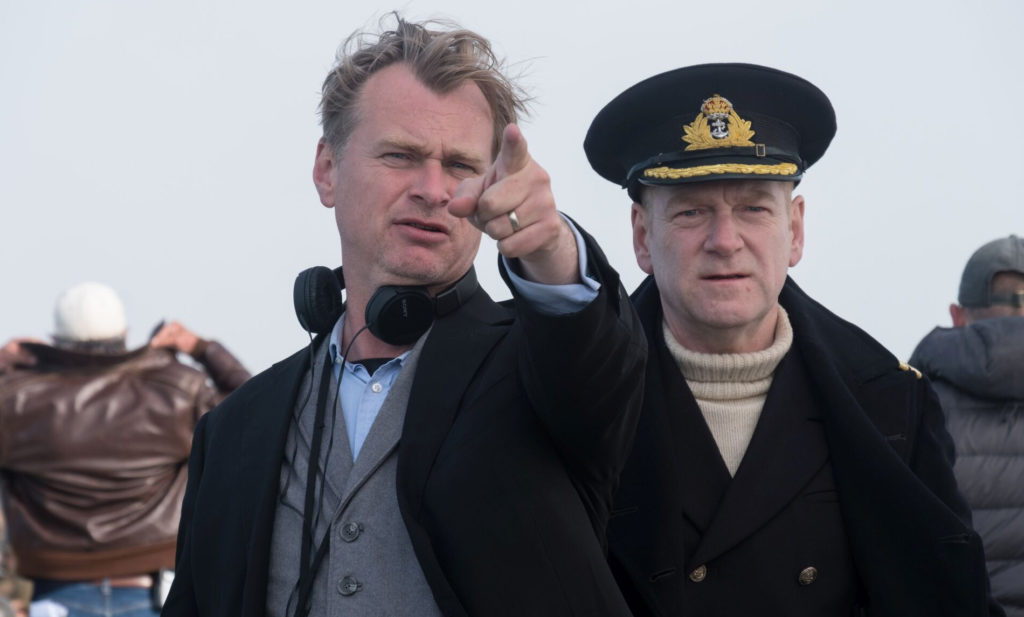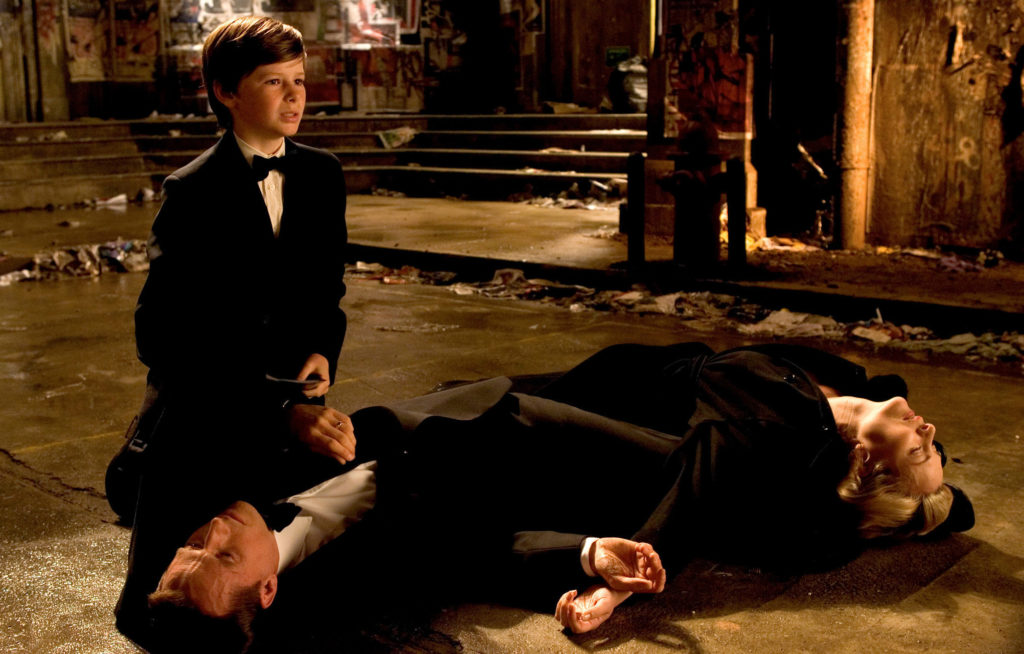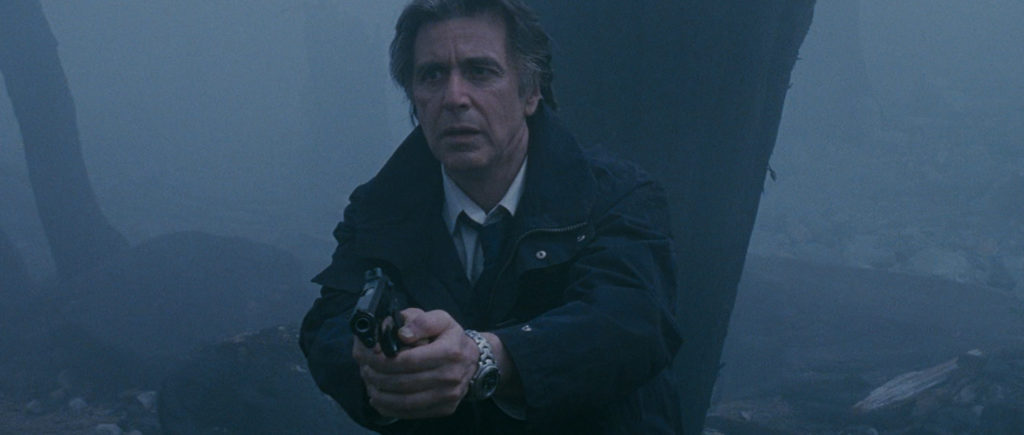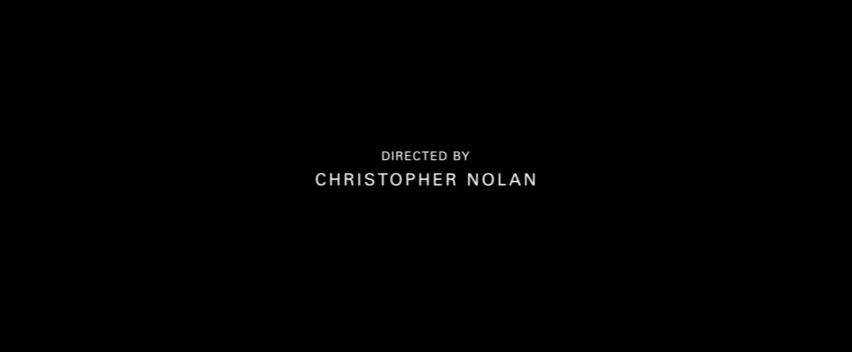
‘Coming To Theaters’ announces the new trailer for Christopher Nolan’s Tenet. Perhaps wisely, it is not date specific. That current 17th July release may end up as wobbly as the temporal laws in the film itself.
But, we will see Tenet at some point in the next twelve months, preferably sooner rather than later. The trailers for Nolan’s 11th theatrical outing promise the you’ve-forgotten-all-about-your-popcorn-event-cinema experience we’ve now come to greedily expect.
Since debuting with 1998’s Following, Nolan’s films have ventured into deep space, deep inside the mind, redefined the superhero movie, and showed us what new ground (air and sea) can be covered in the war movie.
Like his characters in The Prestige, he is the most versatile blockbuster illusionist in his field. But, while Nolan’s films tackle multiple genres, his signature touches remind us who is at the helm. So, with Tenet arriving soon (please Mr. COVID, kindly piss off), here are 10 ways to spot you’re watching a Christopher Nolan film…
1.Time Goes Screwy
Christopher Nolan is the only blockbuster filmmaker with a touch of the theoretical physicist about him. Notably, an elastic approach to time, which rarely runs linear in his movies.
Tenet is the latest example of this and two trailers in we’re still excitedly scratching our heads. According to John David Washington’s lead character, this isn’t time travel, it’s inversion (not inception, that was ten years ago…).
But, the director set out his stall from the get-go with Following and its old-school film noir flashback structure.
In breakthrough title Memento, time run backwards. We see Guy Pearce’s acute amnesiac Lenny shoot a man during the opening credits, soon realising the scene is playing in reverse. The next 110mins unfold end-to-beginning, the audiences piecing together clues as to why Lenny has committed the murder.
Even Insomnia, the seemingly straightforward follow-up to Memento, occurs in an Alaskan town of never-ending daytime.
In Interstellar, the nearer the crew looking for a new home world get to a black hole, the slower time moves. An expeditionary party’s few hours on a potential new planet is over twenty years for the hapless astronaut left aboard the mother ship. And everyone on Earth, including Matthew McConaughey’s character’s kids. Meaning he’s missed a third of their lives, depicted in a powerhouse scene of video messages spanning two decades.
Slowing of time also occurs in Inception, the deeper into a man’s dreams a gang of infiltrators dive. Time turning treacly also infuses the film’s score. Recurring musical motif Non, Je ne regrette rien by Edith Piaf is super slowed for the film’s central soundtrack cue, Half Remembered Dream.
In Dunkirk, three different time lines of one week, one day and one hour criss-cross and converge to breathtaking effect.
The Dark Knight trilogy also goes temporally screwy, although perhaps not intentionally. From Batman Begins to The Dark Knight Rises Bruce Wayne is the Caped Crusader for only about 18 months. Not quite the life’s calling of the character in the comics.
Which leads us to…
2. The Death of a Father Makes You Go Farther
Bruce Wayne loses his pa to a mugger’s bullet, setting him on the road to becoming Batman. Even Interstellar’s Cooper loses both his dad (before the film begins) and father-in-law John Lithgow on his way to saving humankind.

But, a different story is to be had if the loved one is double X chromosome…
3. The Death of a Wife Ruins Your Life
Nolan males react to the death of a spouse by self-destructing rather than confronting their grief. An exception here is Matthew McConaughey’s Cooper, as his job in Interstellar is to save everyone on a self-destructing Earth. But, for the most part, these guys should talk it out more.
Guy Pearce’s character Lenny is haunted by a quest to find his wife’s killer, which we find out is a task without end come the close (or beginning) of Memento.
Christian Bale’s master illusionist Borden drives wife Rebecca Hall to an untimely grave in The Prestige, his obsessive behaviour also bringing about his own downfall.
And in Inception, Leonardo DiCaprio’s Cobb is haunted by the death of wife Marion Cotillard and is being hunted by the police for her murder. Both of which lead him and his crew of REM criminals into one last high-stakes job placing them all at risk. And that happy ending is ambigious at best…
Even Following features the death of a significant female other, which predictably doesn’t bode well for the male protagonist. Same thing in The Dark Knight. When Maggie Gyllenhaal’s Rachel dies things swiftly go south for Bruce Wayne, before his rejection of the Batman symbol at the close of the movie.
The death of a mother doesn’t really get a look-in. Re-watching Batman Begins, it is possible to forget Bruce Wayne loses his mum as well as dad. Linus Roache’s Thomas Wayne receives the lion’s share of the flashbacks; Martha would have to wait until Batman v Superman for her moment of glory…
Fair to say then, that in the Nolanverse…
4. Nothing Comes Easy
It’s hard for Nolan characters to achieve end goals (if indeed, they achieve them at all).
The actual plot of Tenet is being kept under the kind of secrecy comparable to D-Day invasion plans, or the latest Marvel movie. But, it appears to span the globe and concerns stopping a third world war that will be worse than nuclear annihilation. We have a feeling completing that mission will be tougher than that time Batman had to lose that nuclear bomb in The Dark Knight Rises.
Or that other time in 1966 when Adam West’s Caped Crusader had the same problem.
Actually becoming The Dark Knight was a 7-year journey of training and self-discovery in the harsh mountain ranges of the Himalayas.
Christian Bale’s Alfred Borden achieves the ultimate magic trick by having him and his identical twin (or maybe clone) living for years as one person. But, Borden’s perceived mood swings drive his wife to suicide (see The Death of a Wife Ruins Your Life above).
Completing the mission in Inception means venturing into not one, not two, but three different dreams. And from inner space to outer, to save the species in Interstellar requires Matthew McConaughey’s Cooper diving into a black hole with only a space suit for protection.
Then there is Dunkirk. Arguably no characters in Nolan’s filmography have had it as tough as those Tommies trying to get off the beach. Bombs from above, bullets from behind and the cold embrace of the sea in front. Nolan’s triumph is allowing the locations and the elements, plus practical effects work and sound design, to convey what a Herculean achievement it was rescuing over 300,000 men off the sand.
Also making things tougher is…
5. Little is What It Seems
In a body of work where even time itself bends to the will of the filmmaker, you know surprises lay ahead. Sometimes they announce themselves early on: Memento’s temporally topsy-turvy opening credits, Inception’s plastic dream reality.
Other times Nolan saves the reveal for later in the game. Insomnia’s twist occurs at the end of the first act (although credit for that goes to screenwriters of the original 1997 movie, Nikolaj Frobenius and Erik Skjoldbjærg).

Following’s labyrinthine crosses and double crosses are exposed as the movie approaches its climax.
Nolan’s best twists come from (typically dark) emotional states. The Dark Knight Rises has a key shock saved for the climactic moments and Interstellar features two double crosses deep into the mission. These twists arrive because characters believe they are doing the right thing, motivated by (warped) compassion.
Dunkirk follows this pattern with a climactic character reveal that shines light on both the soldiers’ desperation and humanity, making the story point that language barriers should not wall off basic decency.
The Prestige saves its big reveal, and the answer to the central mystery, until the film’s dying minutes. And it is deeply unsatisfying. But…
6. Flaws Don’t Outweigh the Good Stuff
We’re of the opinion Dunkirk is Nolan’s best work to date. But, the director is not without his wobbles.
Interstellar is 70% bold filmmaking, 30% bunkum. Anne Hathaway’s “Love Conquers All” speech should have been overhauled before shoot day.
Marion Cotillard needed to take another run at that silly death scene in The Dark Knight Rises. And while we’re at it, Batman shouldn’t have been Batman for only 18 months. He’s Batman! If he’s polished off organised crime he’ll go after purse snatchers and burglars. Because he’s the goddamn Batman! Batman doesn’t retire!
And while many Nolan movies have meaty parts for women, he seems more invested in the lads than the lasses. We want to see a Nolan film with a female lead, preferably penned by a woman.
And then there’s The Prestige. A five-star movie right up until the final moments when it elects to cheat on its central premise with naff science-fiction.
Thereby ruining a brilliant movie about two rival master illusionists, each attempting to outdo the other in convincing the eye something has occurred the brain knows cannot be true. Doesn’t matter if Nolan was remaining faithful to Christopher Priest’s book, it’s bobbins and spoils a polished yarn.
Yet, one thing distinctly un-bobbins about The Prestige is…
7. Michael Caine is in it (apart from the first three movies)
Okay, you have to forget that Michael Caine was pro-Brexit, stating he’d rather be “a poor master than rich servant”. Easy for a multi-millionaire to say…
But, the artist formerly known as Maurice Micklewhite is a movie legend and we can’t stay mad at him.
Since making his Nolanverse debut with Batman Begins, Caine has become the director’s lucky charm, so we’re happy he’s present and correct in the Tenet trailer.
Every film after that first Dark Knight outing has featured Micklewhite Magic, introducing the legendary actor to a new generation of fans. And reminding older audience members of Caine’s talent. The British legend even crops up in Dunkirk – keep your ears open.
Also keep your ears open because…
8. Hans Zimmer’s Doing The Music
Except in Tenet he’s not! For the first time since 2006’s The Prestige, Hans Zimmer is not scoring the latest Nolan movie. Presumably because he and his team were slightly preoccupied providing music for Wonder Woman 1984, No Time to Die and Dune?
Composer duties on Tenet are the responsibility of Ludwig Göransson, an Oscar winner for his work on Black Panther. We will have to wait and hear if Göransson matches the Zimmer’s bombast that has become the sound of the Nolanverse. The Tenet trailer seems to feature Zimmer cues.
Although Zimmer was not Nolan’s original composer. That was David Julyan, who scored Following, Memento, Insomnia and The Prestige. But, Hans Zimmer became the director’s go-to music man.
The Dark Knight Trilogy is powered by pounding rhythms mirroring the Caped Crusader’s drive against crime. Inception’s woozy guitar work and moments of grandiloquence match the film’s unreality and the sudden panic of night sweats (and gave a multitude of trailers since those signature “bwaahhhs)”. It also did that Edith Piaf super slowed down thing (see Time Goes Screwy, above).
Post-Dark Knight, the music evolved. Interstellar ditched the percussive bombast for a church organ, matching the missionary subtext of the story. Although that’s as far as religious parallels go, Nolan coming across as a staunch rationalist.
Dunkirk is Nolan and Zimmer’s most effective collaboration to date. Using the metronomic ticking of a clock as the base motif, the German-born composer’s score is an astonishing soundscape of pulsating rhythms, surreal aural effects and an invocation of Elgar’s Nimrod. Riding alongside the film’s teeth-rattling sound design, and often dovetailing with it, the score does the talking in a film with sparse dialogue.
We seem to remember Tenet’s score having that Zimmer feel, because of course…
9. We’ve Already Seen Five Minutes in IMAX, Ahead of a Lesser Movie
Nolan loves IMAX. A persuasive argument can be made for him blazing the trail for narrative storytelling using the format. No Nolan, no Pacific Rim, no Godzilla, no Star Wars or Avengers movies in IMAX. Okay, also no Batman v Superman and those Transformers sequels. But, a great artist can’t hold the paintbrush for inferior talents.
Nolan has also made it a sometime event to preview his movies with a 5 or 6-minute IMAX teaser. Always in December, preceding release of the full movie in July the following year. Including this year, we hope…
The Dark Knight’s opening heist wowed audiences in December 2007.
The Dark Knight Rising did the same again in December 2011 with its opening mid-air hijacking. And forced the filmmakers to de-muffle Bane’s voice when it became apparent audiences couldn’t understand the masked ‘roid monster’s mutterings.
Dunkirk was teased for audiences in December 2016, closing out that annus horribilis with the promise of something cinematically extraordinary to come in summer 2017.
These teasers played before lesser movies, leading to inevitable groans when they ended and the main feature began.
The Dark Knight’s teaser preceded I Am Legend. The Dark Knight Rises was hosted by Mission: Impossible – Ghost Protocol. Dunkirk before Rogue One. Okay we’re being harsh on that last one, it’s a great sci-fi war movie. But, it’s not Dunkirk.
Tenet’s five minute assault by masked gunman at a classical concert venue preceded Star Wars: The Rise of Skywalker. And we are confident Nolan’s film will be superior to that divisive final episode in the Skywalker saga.
But, we must say, the segment did not deliver the “wow” moment everyone was expecting (and are in the trailers). The sight of trained mercenaries attacking an enclave of the rich and powerful seemed a little too familiar to The Dark Knight trilogy and Inception (and brother Jonathan Nolan’s Westworld). Not that it is enough to drop Tenet from being our number one anticipated film of the year.
Primarily because, when watching a Nolan movie…
10. Your Jaw is on the Floor
Theatrically, Nolan’s films have crossed $4..8bn to date for an average $480m per outing. Admittedly, the combined theatrical total for Michael Bay’s 13 theatrically released movies is $7.8m, so money is not a sure sign of quality. But you don’t reach the kind of money Nolan’s films are making unless you’re giving audiences something special.
And the British director knows with great budgets comes great responsibility to provide something spectacular.
Batman Begins’ finale in The Narrows. The Dark Knight’s bank heist or underground car chase. The Dark Knight Rises’ unveiling of the Batwing. Inception’s corkscrewing corridor dream fight. Interstellar’s evacuation from the water planet or docking with the spinning space station. Dunkirk’s climactic race against time rescue as the Heinkel bomber bears down on shipwrecked survivors.
What separates Nolan from most blockbuster filmmakers is he successfully weaves spectacle in with story and character. As a director of set-pieces Nolan proves the real deal (even if that includes miniatures) feels tactile and believable, whereas CGI can tumble into the alienating weightlessness of the uncanny valley.
Not to say that Nolan dismisses digital effects. No amount of make-up could replicate the stunning realisation of Harvey Dent as Two-Face in The Dark Knight. Digital airbrushing also proved handy for erasing Tom Hardy’s tattoos in The Dark Knight Rises. And Dunkirk will have employed invisible digital work to remove safety harnesses and hydraulics for scenes when ships go down.
But, Dunkirk will stand the test of time because it conveys the harshness and desperation of the siutation with as much practical filmmaking as possible. Real planes, real ships, real extras, real sea, real deal.
11. Finally, a Bonus Way to Spot If You’re Watching a Christopher Nolan Film
Somewhere it usually says…

Rob Daniel
Twitter: rob_a_Daniel
iTunes Podcast: The Movie Robcast

Pingback: Tenet in Bondage - what 007's release date shift means for 2020 cinema